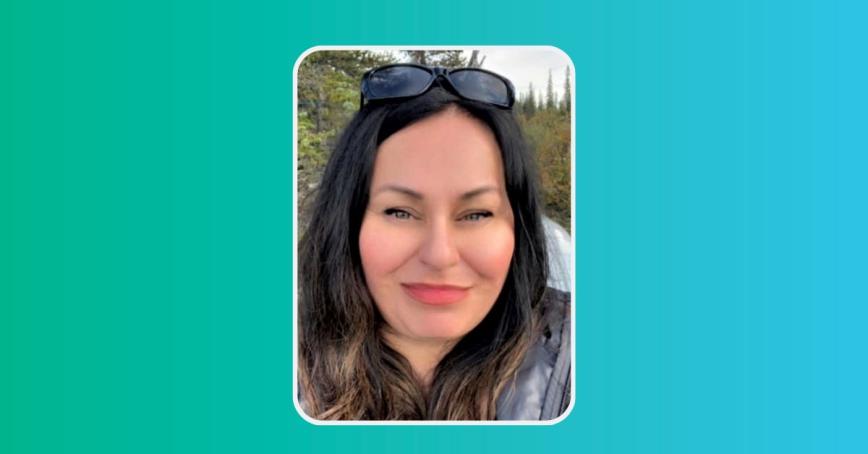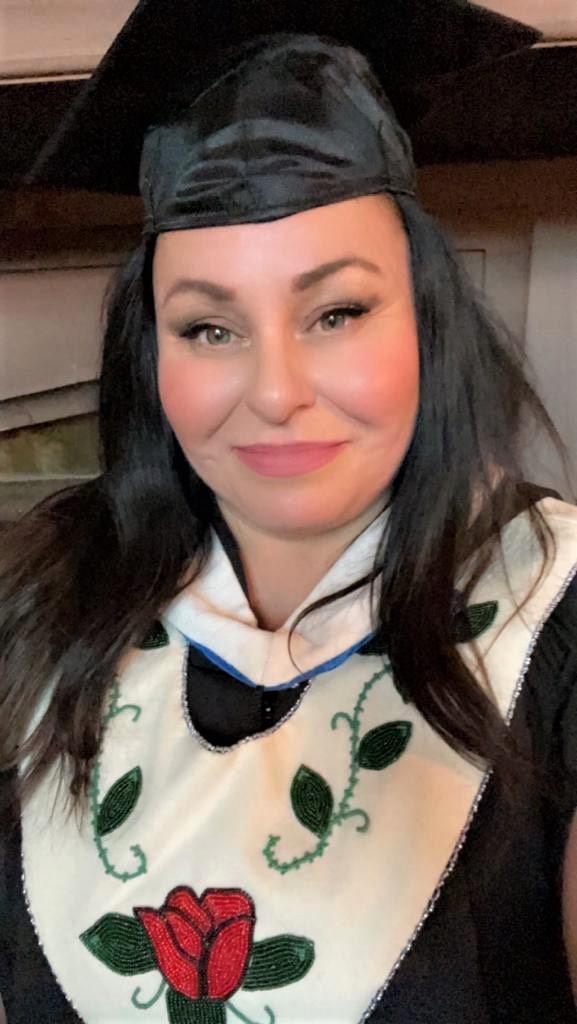RRU doctoral student creates Dëne Sųłıné digital dictionary
Topics
Featured
Share online

A Royal Roads University doctoral student is helping create a digital dictionary to preserve her mother's ancestral language for generations to come.
Shawna Yamkovy completed her capstone project for the Master of Arts in Global Leadership program in June 2022, after visiting the community where she is a band member and her mother was raised, Łutsël K'é Dene First Nation in the Northwest Territories, and meeting with Elders about the project.
Her trip into the community had been delayed due to COVID-19.
“What I had been missing the entire project was to have a sit-down with the community members,” says Yamkovy, now enrolled in RRU’s Doctor of Social Sciences program.
For her project, Yamkovy worked to develop strategies to retain and rejuvenate Dëne Sųłıné yati, much of it lost due to residential schools. Fewer than 10 per cent of the 800 people on the band list still speak Dëne Sųłıné.
A Łutsël K'é Dëne Sųłiné dictionary exists and is used in the school system. With community guidance, Yamkovy's goal was to digitize it, recording fluent speakers pronouncing words and using them in sentences or sharing stories. The idea is that students can learn to link them to concepts and assure that the dictionary was organic and could grow over the years.
Yamkovy’s late mother, Emerence (Emmy) attended St. Joseph Residential School at Fort Resolution from age five to 18. She spoke Dëne Sųłıné in residential school with her siblings whenever possible and during visits with her parents. She remained fluent until her passing in 2001.
The Łutsël K'é community has about 350 residents and is located in the eastern arm of Great Slave Lake, about 280 kilometres from Yellowknife, and is accessible only by air, boat or snowmobile. The community was under lockdown during much of the pandemic, due to health concerns and limited medical access.
Meanwhile, Yamkovy, who lives in Alberta, broadened her project scope, conducting digital surveys and interviews with band members living in her home province.
“I did a brief survey and was able to collect information on the importance of wanting to learn the language, access to learning the language, and those kinds of questions, and that was successful,” Yamkovy says.
She was finally able to visit Łutsël K'é Dene Nation this past June. She flew in on a small Twin Otter jet from Yellowknife, after a day spending time with family there.
“It was a 45-minute flight, and I was almost in tears,” says Yamkovy, who visited the community often as a child, but hadn't returned since before the pandemic.
“It was so emotional for me to finally to be able to get to the community, and an honour to be invited to meet with the Elders to discuss the project.
“We were still deciding on what needed to be done, what the community wanted to do,” she adds.
Much of the discussion centred on land-based learning, getting students out of the classroom and teaching them the culture and language — possibly for months at a time. Knowledge keepers could teach students survival skills including fishing, cutting wood or hunting game like caribou, muskox and moose.
“And these were the things they were saying their teachers had taught them, which were their parents,” Yamkovy says of the Elders. “It was something they spoke very passionately about. “
The meeting was a first step, Yamkovy says, in a longer process of building trust. And “… ensuring that the community is the beneficiary of this project,” says Yamkovy.

Yamkovy completed her capstone project for her master’s degree on June 21, 2022, National Indigenous Peoples Day. She is now working on her doctoral degree in land based Dëne Sųłıné Indigenous Language Revitalization. In September of 2022, Yamkovy flew to Timberbay (ɂedacho tué), on Artillery Lake within the Thaidene Nëné National Park Reserve, with a film crew, a linguist, Łutsël K'é community members, and a group of 16 Māori people from New Zealand. to work on the digital dictionary project for two weeks.
“Māori people are globally quite advanced with their language revitalization strategies,” says Yamkovy, adding they can provide mentorship. “We met several people who regenerated their language after it had lapsed for 100 years.”
The camp at ɂedacho tué has historical significance for the Łutsël K'é Dene, which means 'the lake of the big caribou crossing.'
“This is where the community would gather when the caribou came on their migration paths,” says Yamkovy, whose great-grandparents had a log cabin there.
A cabin was built for the community in the area, where Yamkovy and the group camped and also participated in a caribou harvest as part of the grant-funded cultural exchange.
Video content of the project is also being created by Kelly Steele of Might for Right Productions, in collaboration with the First Nations Education Foundation (FNEF) and grant contributor NIB Trust. Content exists to also make education and training episodes for the school and the community. The Łutsël K'é Dene Nation will determine the uses of the content, which will be owned by the community.
“It's up to the community what they want to do,” Yamkovy says.
She adds the project should be completed shortly.
“The dictionary project is going to be a huge resource to offer the community for years and generations to come, with the ability to hear these speakers,” Yamkovy says. “To have this in a formalized way and incorporated into an educational tool forever – the benefits are going to be great for the community, supporting this path of language revitalization.”
We always want to hear stories about the people, programs and places that are the Royal Roads experience. Share yours via the Royal Roads Story Exchange and it could be featured on our website and social media.